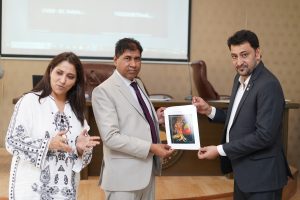- Advertisement -
ISLAMABAD, Aug 22 (APP): The Climate Hub Forum (CHF), in partnership with Pir Mehr Ali Shah Arid Agriculture University (PMAS-AAUR), on Friday convened a high-level policy dialogue on “Climate Justice & Nature-Based Solutions: From Local Roots to Global Impact”.
The forum brought together legal experts, policymakers, researchers, and international partners in a hybrid event aimed at translating global climate law into concrete, equitable action—particularly for the Global South, where climate impacts are most acutely felt, said a press release.
The event came in the wake of the International Court of Justice’s (ICJ) July 2025 advisory opinion, which confirmed that states have binding legal obligations to prevent climate harm, recognized inter generational equity as a matter of justice, and legally acknowledged the impacts of fossil fuels.
Speaking at the opening session, CHF founder and UN NGL Fellow Erum Khan stressed that the ICJ ruling must lead to policy reform, accessible climate finance, and just energy transitions. She underlined the urgency of debt-free and fair climate funds, warning that “loss and damage finance must reach those who suffer — not remain on paper.”
Erum Khan also announced the launch of the Climate Justice & Regenerative Systems Commission, aimed at taking Pakistan’s voice to international platforms, including COP30.

Dean of Sciences at PMAS-AAUR, Prof. Dr. Rahmatullah Qureshi, highlighted the university’s pioneering research in climate-smart agriculture, hemp-based innovations, and mangrove restoration. He invited global partners to collaborate on research-driven solutions.
Former minister Barrister Shahida Jamil, emphasized the need for inclusive global forums to ensure accountability and solidarity. She proposed the creation of a “Global Climate Solidarity Forum” to safeguard cooperation and sustainable outcomes.
Speakers such as former EU Parliament member Bodil Valero, KPK’s Secretary for Climate Change Shahid Zaman, and academic representatives from NUST underscored that urban resilience, biodiversity finance, and community-led initiatives were key to climate justice.”Climate justice is no longer optional—it is a legal imperative”, they stressed.
The key outcomes of the dialogue included the launch of the Climate Youth Advocate Program (CYAP) to empower young leaders, , the formation of a Climate Action Commission, and strengthened pathways for climate finance, urban resilience, and community-led restoration projects.
The dialogue positioned Pakistan as a leader in nature-based solutions, climate finance innovation, and Global South climate diplomacy.

